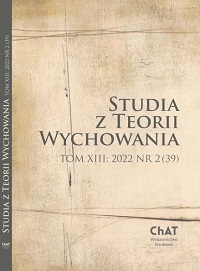Dziecięce doświadczanie edukacji zdalnej - codzienność pierwszoklasistów
Children’s experience of distance learning – the everyday life of first graders
Author(s): Jolanta Bonar, Zuzanna ZbrógSubject(s): Social Sciences, Education
Published by: Wydawnictwo Naukowe ChAT
Keywords: early education; everyday school; pandemic
Summary/Abstract: The purpose of this paper is to present the everyday school life of younger pupils in pandemic times. The rationale behind the study (conducted from the child’s perspective) lies in the conviction that minors are active actors who understand and interpret the social reality around them and, therefore, are the most reliable source of information (for adults) on the meaning of everyday situations for them. It is validated by a new sociology of childhood that treats children as active agents who play a major part in creating their own childhood (Corsaro, 2015). The research material was collected through a focus group interview with first grade pupils from selected primary schools in Poland. This helped the authors understand children’s experience of distance learning. Analysis of the collected material reveals the many and diverse experiences children have regarding e-learning. The study makes it possible to identify the main categories impacting their daily school-related activities, the tangible environment that constitutes the physical space behind these activities, and the accompanying emotions. It shows that the peculiar nature of distance learning (resulting from changes in social relationships, level of competences – especially digital – and the different degree of support from family and teachers) meant that pupils’ education in the pandemic provoked very strong, diverse emotions. Negative feelings predominated, including the fear and sadness typical for dangerous situations. Celem artykułu jest pokazanie codzienności edukacyjnej dzieci w młodszym wieku szkolnym w dobie pandemii. Badanie optyki dziecka wyrasta z przekonania, iż to właśnie dzieci, będące aktywnymi podmiotami rozumiejącymi i interpretującymi rzeczywistość społeczną wokół siebie, stanowią najbardziej wiarygodne źródło informujące dorosłych o tym, jakie znaczenie mają dla nich sytuacje z ich życia codziennego (Corsaro, 2005). Materiał badawczy zgromadzono za pomocą wywiadu fokusowego, przeprowadzonego z uczniami klas pierwszych wybranych szkół podstawowych w Polsce i pomagającego wniknąć w sposoby dziecięcego doświadczania edukacji zdalnej. Analiza zebranego materiału badawczego wskazuje na zróżnicowane doświadczenia dzieci związane z edukacją zdalną. Pozwala wyłonić dominujące kategorie dotyczące: codziennych czynności dzieci związanych z uczeniem się, środowiska materialnego stwarzającego fizyczną przestrzeń służącą do ich wykonywania oraz towarzyszących im emocji.
Journal: Studia z Teorii Wychowania
- Issue Year: XIII/2022
- Issue No: 2 (39)
- Page Range: 103-117
- Page Count: 15
- Language: English

